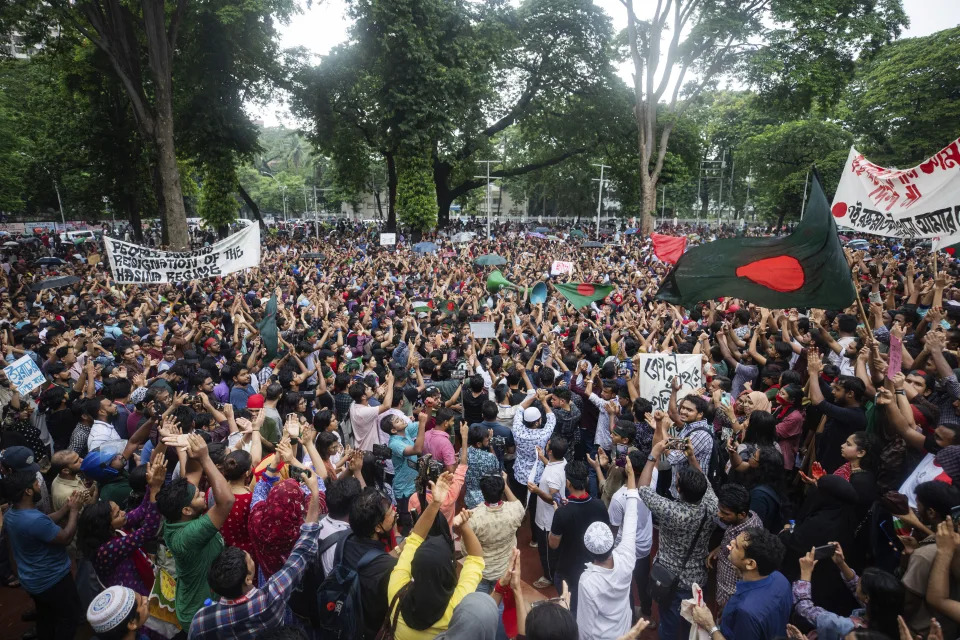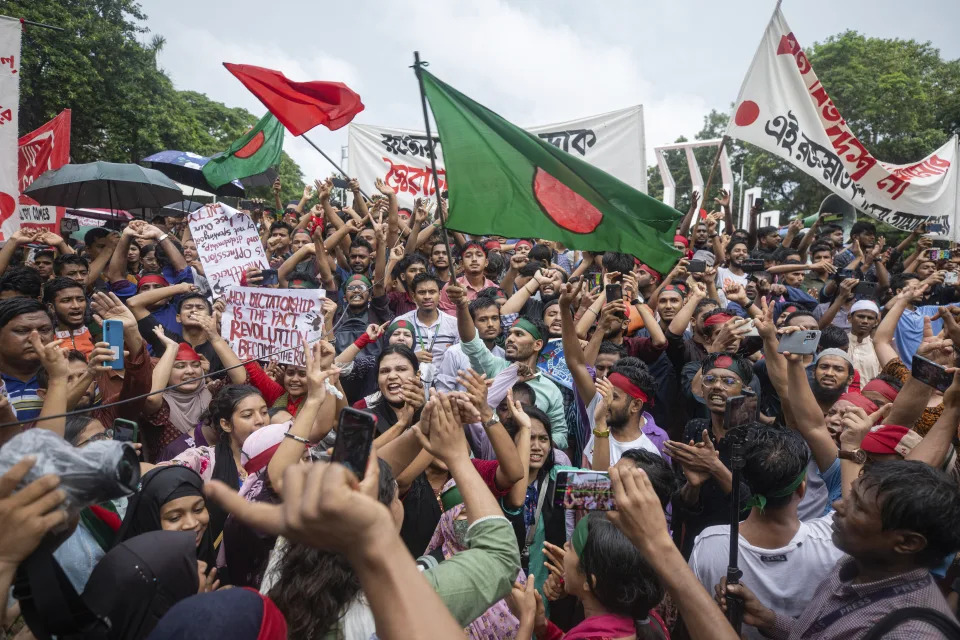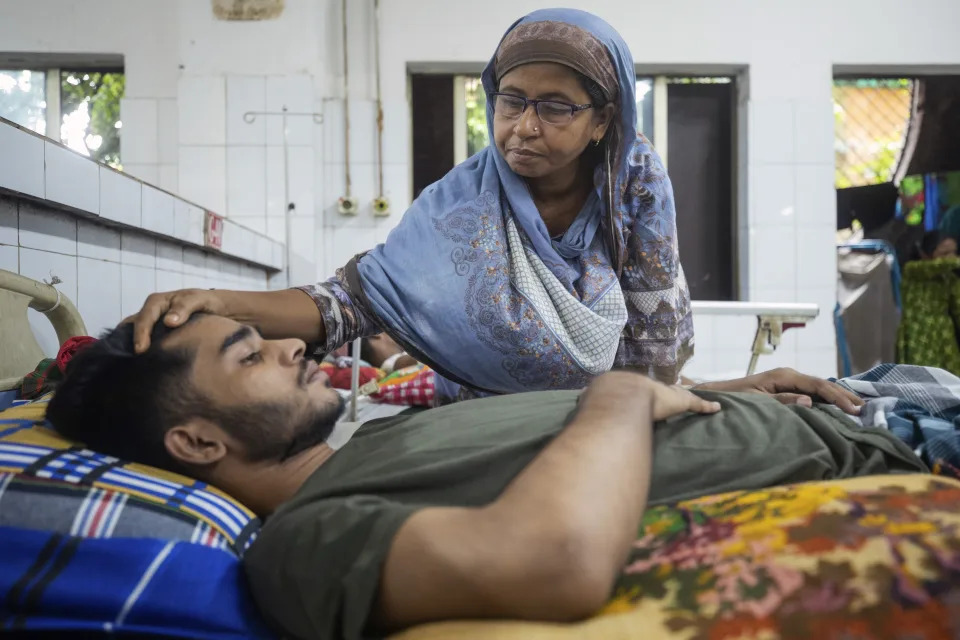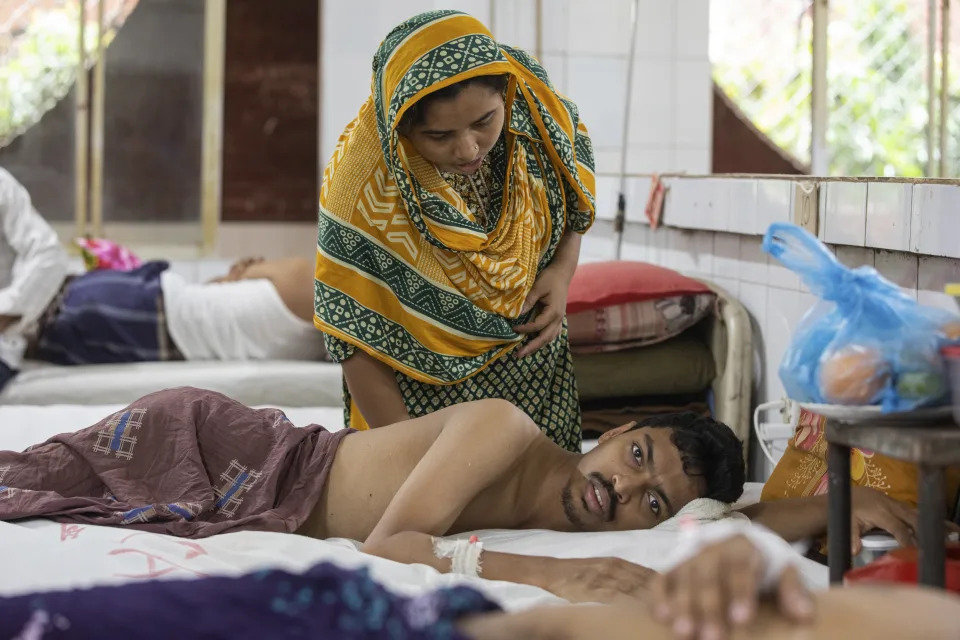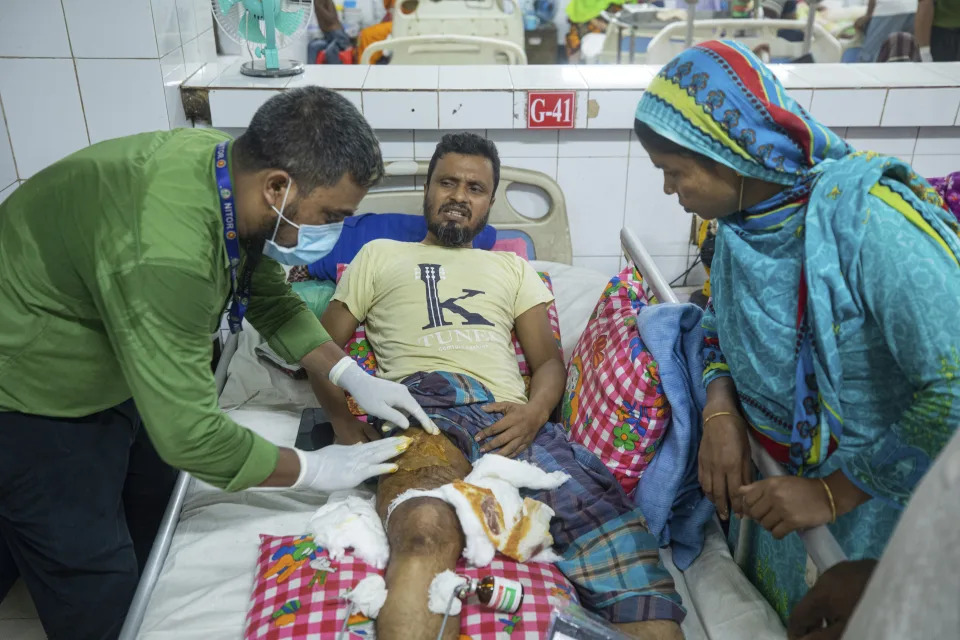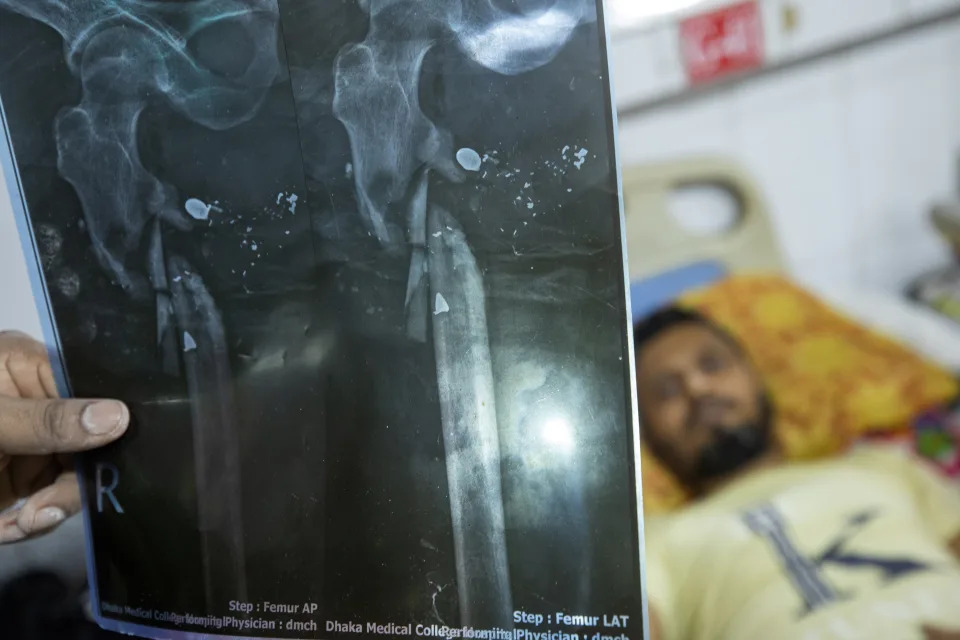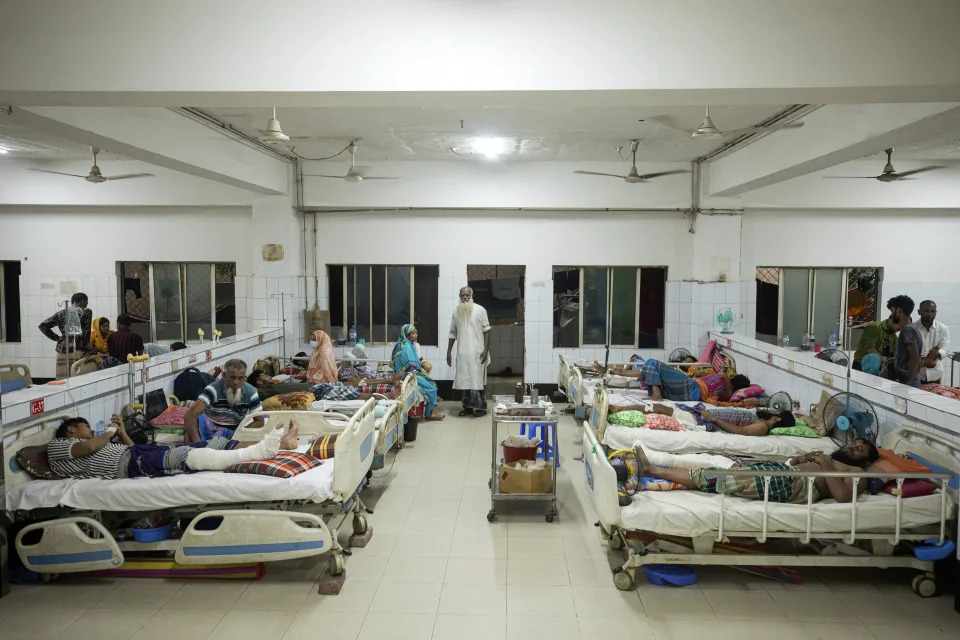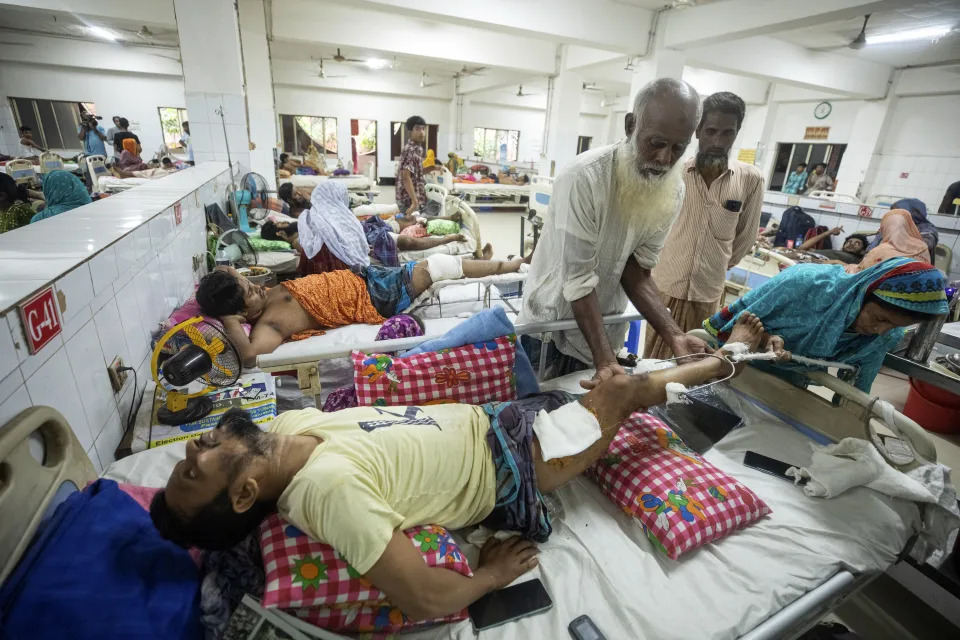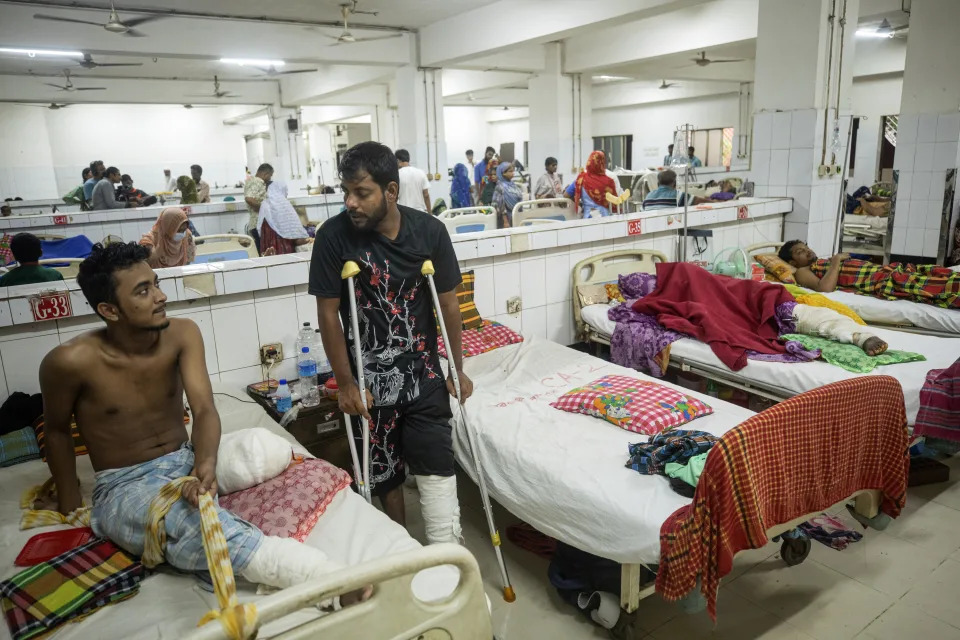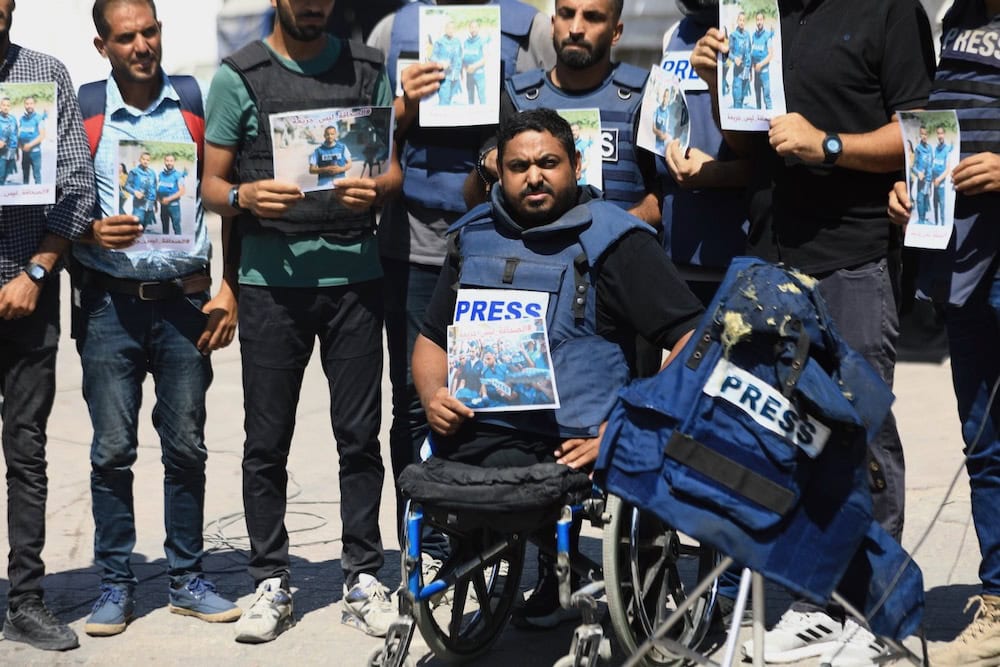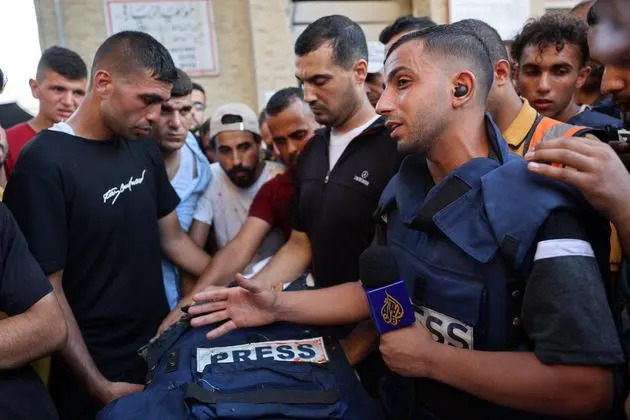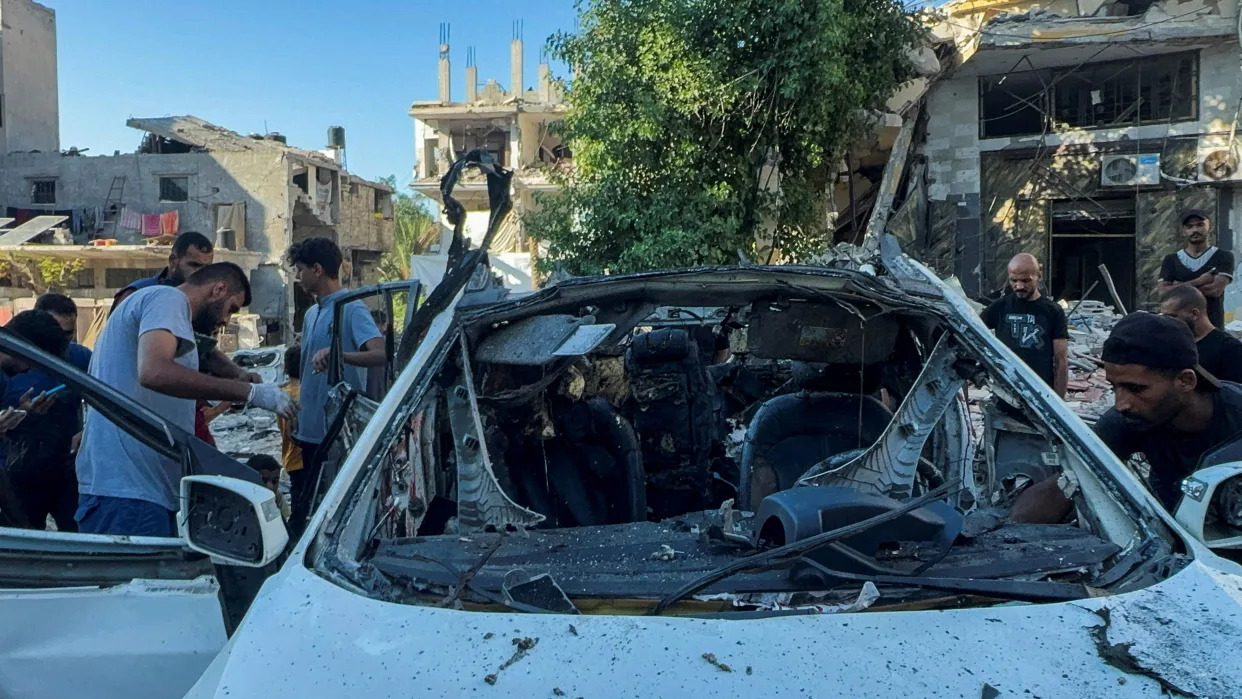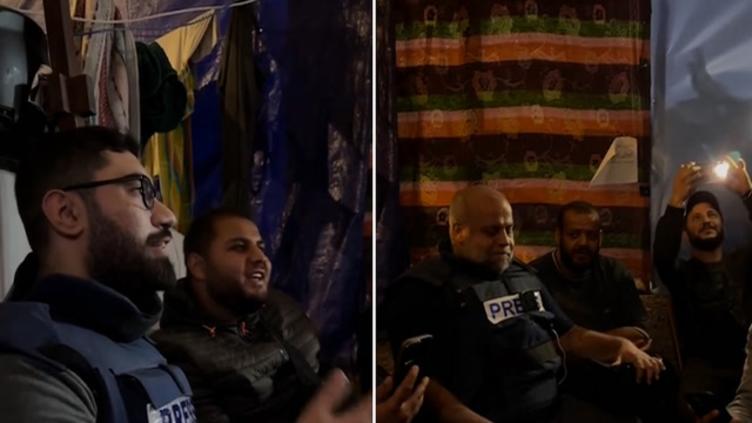Tens of thousands of people insist justice is needed for more than 200 killed amid recent clashes with security forces.
BenarNews staff
2024.08.02
Dhaka

At least two people were killed as fresh protests exploded Friday in Bangladesh with tens of thousands demonstrating nationwide and many calling for Prime Minister Sheikh Hasina’s resignation.
More than 100 people were injured in scuffles with police who used tear gas and rubber bullets against demonstrators who were demanding justice for the more than 200 who lost their lives in last month’s civil unrest.
The police action Friday came days after the international community slammed Bangladesh’s security forces for their response to what began in early July as protests by university students against quotas in some government jobs.
In many places, protesters and other witnesses told BenarNews that supporters of the ruling Awami League party aided police on Friday, with the opposing sides often coming to blows – university students last month leveled an identical accusation as causing the deadly violence.
Nizam Uddin Ahmed, a political analyst and retired professor at Chittagong University, indicated that the Hasina government might have been taken aback by the continuing agitation.
“Everybody thought the protests would end as the government met the demands of the students asking for quota reform, but it is not happening,” he told BenarNews.
“But every day students and people from other walks of life have been joining [protests]. Now the protest has spilled over to the upazilla [sub-district] level."
The former professor was referring to a July 21 Supreme Court ruling that reduced quotas in civil service jobs to 7% from 56% – these quotas had been the cause of the original protests.
The government had also arrested more than 9,000 people across the country as of last Sunday, most of them opposition members or supporters, and students. Analysts had said it was a bid to prevent more protests.
Safwan Wasik, a student at Dhaka’s Bir Shrestha Munsi Abdur Rauf Public College, said that he and many classmates who were protesting were afraid to stay home for fear of arrest.
“Sheikh Hasina must resign for mass arrests and intimidation,” he told reporters, adding the PM bore responsibility for the lives lost.
The release Thursday from so-called detention of six students police said they had taken into custody for their safety did not mollify the many Bangladeshis who came out to demonstrate. The students’ relatives and friends had said the six had made no request for protective custody.
At several protests in the capital, participants could be heard chanting “point one, demand one, resignation of Sheikh Hasina,” or similar slogans demanding the prime minister step down.
A leader of a group called Bangladesh Students Union, Ragib Naeem, said that among his organization’s demands were Hasina and her government’s resignation, the release of arrested students and the reopening of educational institutions.
The student agitation has widened with teachers, artists, civil society members and other professional groups such as lawyers taking to the streets and calling for accountability for last month’s violence.
Last month’s deadly clashes were the worst civil unrest the Hasina administration had seen in nearly 15 years of continuous power.
The university students alleged unprovoked attacks by police and members of the student wing of the ruling Awami League. The government, in turn, accused the opposition of fomenting the violence.

One of the two people killed on Friday lost his life in one such incident of violence between government supporters and protesters.
Day laborer Mostak Mia, was caught in a clash between police and students in Sylhet district in northeastern Bangladesh, said Aminul Haque Sarker, the superintendent physician of Habiganj district.
Mostak, 26, sustained a “bullet injury” and died en route to the hospital, Aminul told BenarNews. Asked whether Mostak’s injury was caused by a live or rubber bullet, the doctor said only a post-mortem may help determine that.
The second person killed Friday was an on-duty constable beaten to death by “angry” locals in the Gollamari neighborhood of Khulna city in southwestern Bangladesh, Md. Mozammel Haque, the Khulna metropolitan police commissioner, told journalists.
In response to Friday’s huge nationwide agitation, Obaidul Quader, road transport and bridges minister, claimed that law enforcement had been ordered not to harass or detain students “unnecessarily,” according to the state news agency Bangladesh Sangbad Sangstha (BSS).
Obaidul blamed unnamed people with ulterior motives for continuing the protests.
“[A] vested quarter is trying to gain interest by playing the government-versus-students game. It carried out destruction capitalizing on the students,” said Obaidul, who is also the ruling Awami League’s general secretary, according to BSS.
He added that judges had been appointed to a commission set up to investigate last month’s killings. The commission’s scope had been expanded as well, he said.
“Any country or organization, including the United Nations, can join the probe. The government will welcome [that],” he said.
Obaidul was alluding to a response by Stephane Dujarric, spokesman for the U.N. secretary-general, to a reporter’s question Wednesday about whether the world body would assist with investigating why the protests turned deadly.
“We are, of course, always ready to assist governments anywhere who may request help with different issues, and we see how we can best do that,” Dujarric said, according to a transcript of the exchange.
“In terms of independent investigations, as you know, that would require, as in any of these cases, mandate from a legislative body of this organization,” he added.
 P
PAnother U.N. body, UNICEF, said the Bangladesh violence had claimed the lives of at least 32 children, with many more injured.
It is everyone’s responsibility to protect children at all times, Sanjay Wijesekera, UNICEF regional director for South Asia, said in a statement Friday.
“This is a terrible loss. … I am aware of reports that children are being detained and remind authorities that for a child, coming into contact or conflict with the law can be very frightening,” he said.
He reminded the South Asian nation's government that Bangladesh is a signatory to the U.N. Convention on the Rights of the Child.
“This means that children should not be arrested or detained based on their mere presence in any location or because of their background, religion, or acts or beliefs of their family members,” he said.
Teargas shells and rubber bullets
Agitation surged Friday in Dhaka, Chittagong, Khulna and about 20 additional districts.
Students chanted anti-government slogans, carried signs with photos of those who were killed, caricatures of a grinning Hasina and pictures of some ministers they held responsible for last month’s events.
In the Muslim-majority country’s capital, hundreds of protesters gathered after Friday prayers in different parts of the city.
Police fired teargas shells and rubber bullets in the Paltan and Baitul Mokaram neighborhoods.
In the Mirpur neighborhood, protesters, especially students, were seen challenging police to shoot them. They were referring to the many casualties by gunshot last month.
In some parts of Dhaka, ruling party members came out after weeks in hiding and took positions on the streets, some with silent processions, to counter the anti-government protesters – and they said as much

Md. Elias Uddin Mollah, a lawmaker from Hasina’s Awami League, led protests in Mirpur.
Another Awami League member and neighborhood leader, Aynal Ahmed, blamed the country’s largest faith-based party, Jamaat-e-Islami, and its student wing, Bangladesh Islami Chhatra Shibir, which were banned this week after the government alleged they were responsible for the July violence.
“We have taken a position to counter the violent attempt of the Jamaat-Shibir,” Aynal told BenarNews.
Residents there told BenarNews that ruling party men and their armed “goons” had been attacking houses where some women protesters tried to take shelter when the clashes began.
“They threatened the guard of the house to get them [the protesters] out of the house or face punishment,” Ayan, one of the protesters, whose second name has been withheld for safety reasons, told BenarNews.
“The women students [then] sought help through Facebook posts.”
Internet restricted
Early Friday evening, Netblocks, a pro-democracy organization that monitors online connectivity, reported that the Bangladesh government had restricted internet access again.
“Metrics show social media and messaging platforms Facebook, WhatsApp and Telegram are again restricted in Bangladesh with mobile data also limited; the censorship measures come as students call for protests over killings and arrests at last month’s quota protests,” it said in a post on X.
The government had completely shut down the Internet for several days during last month’s deadly violence and continued to restrict access to social media sites after an uneasy calm was restored following its imposition of a curfew complete with shoot-on-sight orders.
On Friday, Students Movement Against Discrimination, the group that led the anti-quota movement, called for more nationwide demonstrations Saturday. It also pushed for full non-cooperation beginning Sunday, although the group did not explain what that meant.
Nizam, the former Chittagong University professor, said the protests had moved past the original concern regarding quotas in some government jobs.
“The quota is no more an issue. The issue is the killing of so many people. The government must shoulder responsibility for the killings,” Nizam said.
“It would be a serious mistake if it used repression.”
August 02, 2024
By VOA News
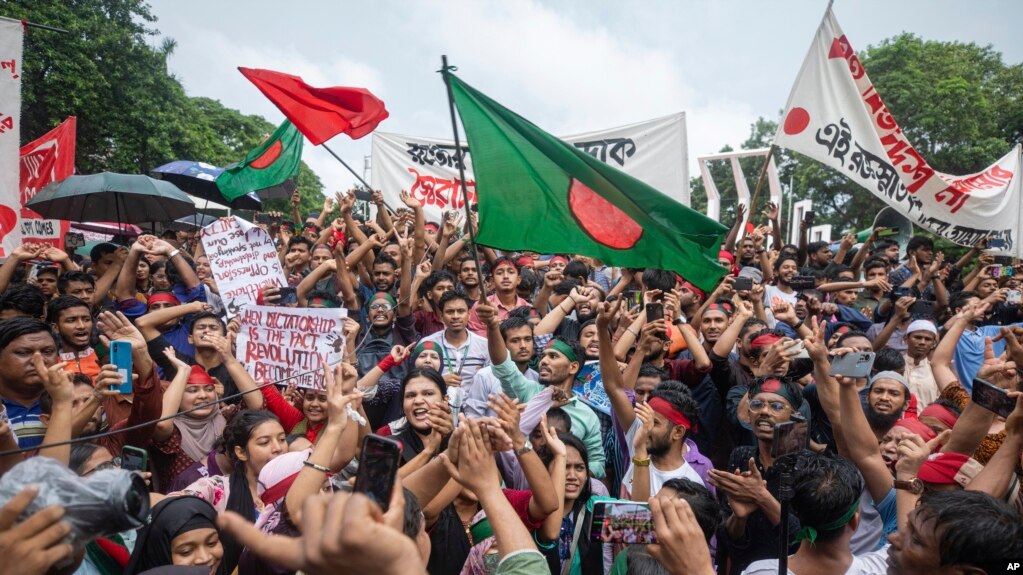
Thousands of people took to the streets of the Bangladesh capital, Dhaka, again on Friday, clashing with police and calling for the resignation of Prime Minister Sheikh Hasina as they demanded justice for more than 200 people killed in demonstrations last month.
Reports from the capital said police fired tear gas and rubber bullets at demonstrators and lobbed stun grenades in some areas of the city, while crowds attacked police with stones. The Reuters news agency reported at least 20 people were injured in the clashes.
The Daily Star, an English-language newspaper based in the capital, reported that a police officer was killed after being attacked by protesters in Dhaka's Khulna neighborhood, while a man was killed and 50 others were injured in the Habiganj district.
The newspaper said that more protests were planned across the country Saturday and Sunday.
The unrest is the worst of Hasina's 15-year tenure. She was reelected to a fourth consecutive term in January.
Protests focus on job quota system
Violence erupted on July 15 when students, frustrated by a lack of job prospects, led protests against the nation's government job quota system. That system reserved more than half of all government jobs for certain groups, particularly ruling party loyalists.
The protests turned deadly when, organizers said, protesters were attacked by police and pro-government groups. As the violence spiraled, Hasina's government imposed a nationwide curfew and shut down the nation's mobile internet network.
Deadly clashes between the protesters and security officers during the crackdown left more than 200 people dead. In a statement Friday, the South Asia regional director of the U.N. Children's Fund, Sanjay Wijesekera, said 32 of those killed during the protests were children.
Wijesekera said in the statement that he was also aware of children being detained by authorities in connection with the protests. According to international human rights and the United Nations Convention on the Rights of the Child, to which Bangladesh is a signatory, he said, children should not be arrested or detained and called for an end to the practice.
The violent crackdown on the protesters has drawn international condemnation from the United Nations as a whole and the United States.
Some information for this report was provided by The Associated Press, Reuters and Agence France-Presse.
Fri, August 2, 2024
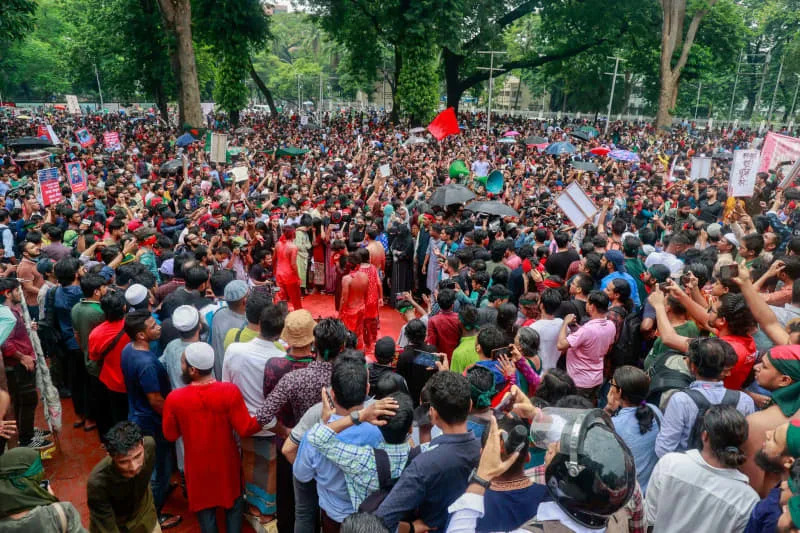
Bangladeshi Students, teachers, parents, artist, representatives of civil society and leaders of various student organizations join a mass demonstration in Dhaka. Thousands of people took part in a nationwide prayer and student procession to protest the "massacre and mass arrests" following recent protests by the Quota Reform Movement, which is demanding reforms to the government's job quota system. Suvra Kanti Das/ZUMA Press Wire/dpaMore
At least two people, including a policeman, were killed in clashes as fresh protests erupted in Bangladesh on Friday.
In Dhaka, thousand of people took to the streets to demand justice for police killings and other atrocities committed during last month's student-led demonstrations, which had called for reforms in the government's job quota system.
The protesters chanted slogans like "down with the autocrat," accusing Prime Minister Sheikh Hasina’s government of carrying out the killings and enforced disappearance of many activists.
In the city of Khulna, some 130 kilometres south-west of the capital Dhaka, a policeman was beaten to death by demonstrators, Mozammen Haq, the city police chief, told reporters on Friday evening.
At least 20 other officers suffered injuries, he said, adding that the police fired tear gas canisters and rubber bullets to disperse the mob.
Some 50 protesters were also wounded, the daily Prothom Alo reported.
A 26-year old man was shot dead in the north-eastern town of Habiganj after the protesters faced off with the police, said Aminul Haq Sarker, a physician at a state-run hospital there said.
He said the protester suffered bullet wounds in his back and chest, and was pronounced dead as he was rushed to the hospital.
Police, however, said they could not confirm the man's death.
The protesters also set to fire the office of the local Habibganj chapter of the ruling Awami League party.
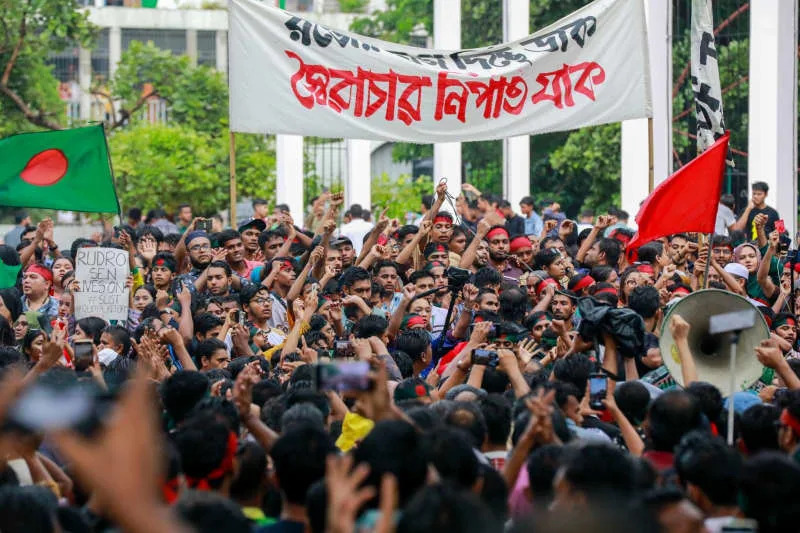
Bangladeshi Students, teachers, parents, artist, representatives of civil society and leaders of various student organizations join a mass demonstration in Dhaka. Thousands of people took part in a nationwide prayer and student procession to protest the "massacre and mass arrests" following recent protests
Shafiqul ALAM
Fri, August 2, 2024
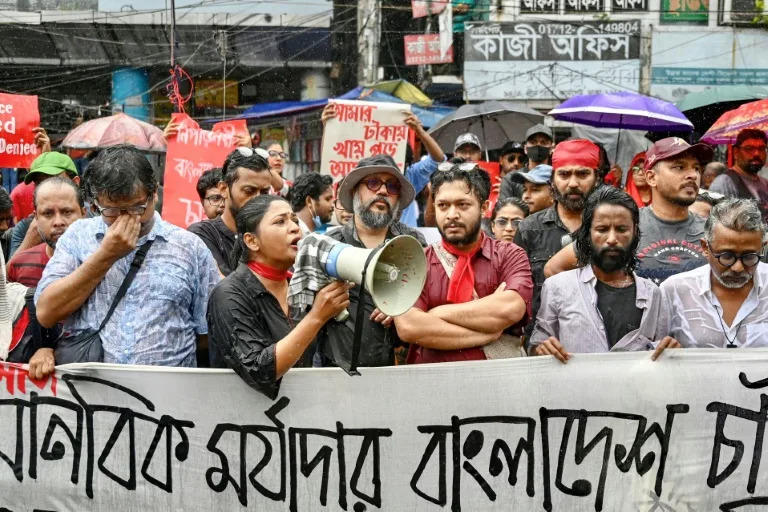
Protestors rally to demand justice for victims of nationwide unrest and police crackdown (Munir UZ ZAMAN)
Demonstrations in Bangladesh after Friday prayers demanded justice for victims of nationwide unrest and police crackdown, after the release of protest leaders failed to quell public anger.
Student rallies against civil service job quotas sparked days of mayhem that killed at least 206 people last month, according to an AFP count of police and hospital data.
The violence was some of the worst of Prime Minister Sheikh Hasina's 15-year tenure, and the actions of her government's security forces provoked widespread rancour at home and international criticism abroad.
A day after police freed six top members of the group which organised the initial protests, its leaders urged their compatriots to once again return to the streets.
"We want justice for the murders of our sisters and brothers," Students Against Discrimination said in a statement.
Thousands of young men in the capital Dhaka and the port city of Chittagong heeded the call after midday worship in the Muslim-majority nation, defying torrential monsoon rains.
"Why are our brothers in graves and the killers outside?" one crowd chanted outside the country's largest mosque in central Dhaka, a teeming megacity of 20 million people.
Students Against Discrimination had demanded the release of its detained leaders, three of whom were forcibly checked out of a hospital and taken away by plainclothes police last week.
Their release was a sign the government was hoping to "de-escalate tensions" with protesters, University of Oslo researcher Mubashar Hasan told AFP on Thursday.
But other demands by the students remain unmet, including a public apology from Hasina for the violence and the dismissal of several of her ministers.
They have also insisted that the government reopen schools and universities around the country, all of which were shuttered at the height of the unrest.
- 'She must go' -
Many protesters have gone further, demanding Hasina step down altogether.
"She must go," writer and activist Arup Rahee told AFP from a rally in the capital. "There will be no justice for the student murders if she remains in power."
Internet outage monitor Netblocks reported that service providers had again restricted access to Facebook, WhatsApp and Telegram, all used last month to organise protests.
"We were instructed by the authorities to block Facebook," said an official from one phone company, speaking on condition of anonymity.
Hasina, 76, has ruled Bangladesh since 2009 and won her fourth consecutive election in January after a vote without genuine opposition.
Her government is accused by rights groups of misusing state institutions to entrench its hold on power and stamp out dissent, including the extrajudicial killing of opposition activists.
Demonstrations began in early July over the reintroduction of a quota scheme -- since scaled back by Bangladesh's top court -- that reserved more than half of all government jobs for certain groups.
With around 18 million young Bangladeshis out of work, according to government figures, the move upset graduates facing an acute employment crisis.
Critics say the quota system was used to stack public jobs with loyalists to the ruling Awami League.
- 'Excessive and lethal force' -
Last month's protests had remained largely peaceful until attacks on demonstrators by police and pro-government student groups.
Hasina's government eventually imposed a nationwide curfew, deployed troops and shut down the nation's mobile internet network for 11 days to restore order.
European Union foreign policy chief Josep Borrell this week condemned the police clampdown that followed for "excessive and lethal force against protesters and others", urging an independent investigation into their conduct.
Home Minister Asaduzzaman Khan told reporters last weekend that security forces had operated with restraint but were "forced to open fire" to defend government buildings.
At least 32 children were among those killed last month, the UN childrens' agency said Friday.
Diplomats said Hasina's government had approached the United Nations to assist with its own probe into the unrest but had been rebuffed.
"The UN called for an impartial, independent and transparent investigation into all alleged human rights violations," a United Nations official told AFP on condition of anonymity.
"The UN, however, does not support national investigations in the way that is being suggested."
sa/gle/fox
JULHAS ALAM
Updated Fri, August 2, 2024
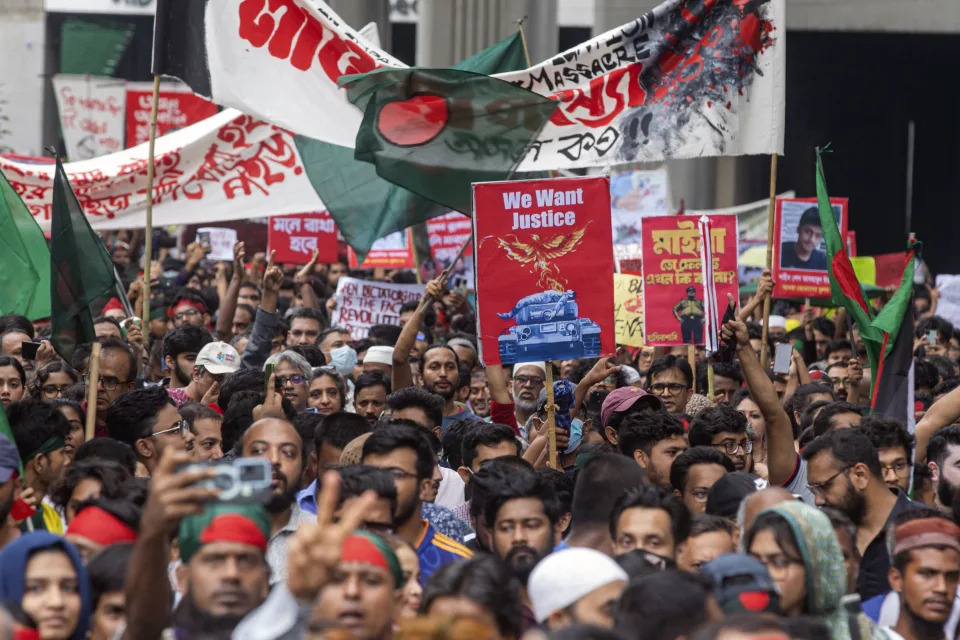
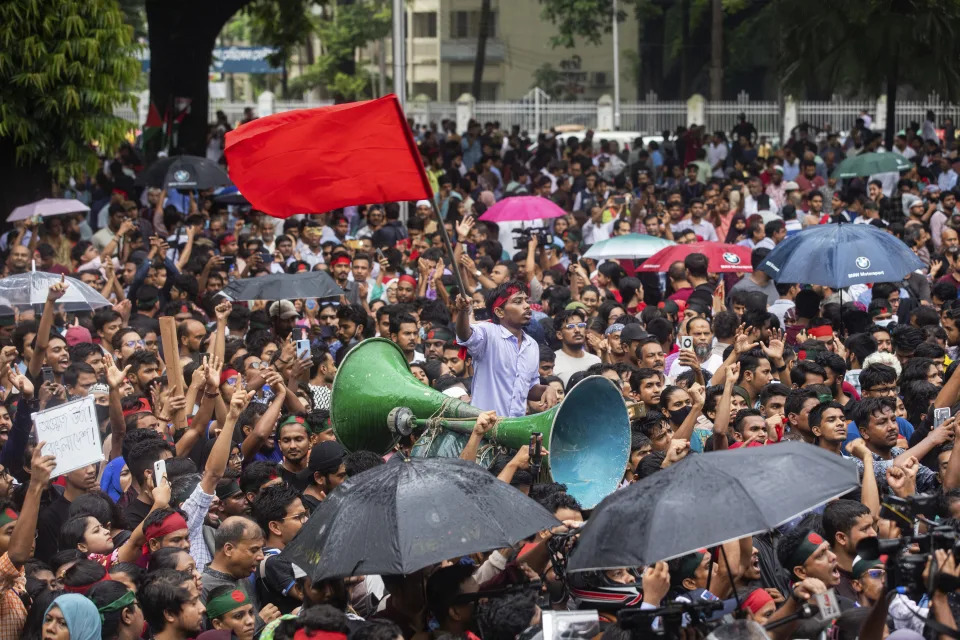
Activists take part in a protest march against Prime Minister Sheikh Hasina and her government to demand justice for more than 200 people killed in last month's violent demonstrations, in Dhaka, Bangladesh, Friday, Aug. 2, 2024. (AP Photo/Rajib Dhar)
DHAKA, Bangladesh (AP) — New protests erupted in Bangladesh on Friday, leaving two people dead and more than 100 injured — the latest in a wave of unrest that killed more than 200 people last month in violent demonstrations following weeks of rallies over controversial reforms in the job quota system.
Over 2,000 protesters gathered in parts of the capital, Dhaka, to rally against Prime Minister Sheikh Hasina’s government, some shouting “down with the autocrat” and demanding justice for victims. Police and dozens of students clashed in Dhaka's Uttara neighborhood. Security officers fired tear gas and stun grenades to disperse stone-throwing protesters.
In the southwestern district of Khulna, police fired tear gas and rubber bullets, injuring 50. A policeman died after the protesters attacked him, the Dhaka-based English-language Daily Star reported.
The paper said a man died and 50 were injured in the northeastern district of Habiganj after an arson attack on a local office of the ruling Awami League party. The man, an electrician, had gone to town to buy shoes when bullets hits him in the head, the paper said.
In the southeastern city of Chattogram, about 1,000 protesters held a procession after Friday prayers and set a roadside police guard post on fire, the report said.
The student protests against the government, which show no signs of dying down, started as a peaceful demonstration against a quota system allocating government jobs but morphed into an unprecedented challenge and rebellion against Hasina, whose 15-year-long dominance over the country is now being tested like never before.
Hasina, 76, was elected for a fourth consecutive term in January in a vote boycotted by her main opponents, making the result a near certainty even before votes were counted.
Since the violence erupted on July 15, authorities have shut off the internet and enforced a shoot-on-sight curfew. Schools and universities remain closed.
Dramatic videos of deadly clashes between police and protesters have shaken Bangladesh, as has the case of a six-year-old girl who was shot while playing on a rooftop while her father unsuccessfully tried to shield her from the firing.
The wave of discontent started with students, frustrated by shortages of good jobs, demanding an end to a quota system for government jobs that they argued was discriminatory. Under the system, 30% of such jobs were reserved for relatives of veterans who fought in Bangladesh’s war of independence against Pakistan in 1971. They said it benefited supporters of Hasina, whose Awami League party led the independence movement, and wanted it replaced with a merit-based system.
The Supreme Court scaled back the veterans' quota to 5% but protests continued, something experts say reflects more widespread anger against the government and economic discontent.
“There have been plenty of protests during the Awami League’s regime over the last 15 years, but nothing as large, long, and violent as this one,” said Michael Kugelman, director of the South Asia Institute at the Wilson Center in Washington.
This time, there appeared to be a perfect storm, Kugelman added — an unpopular quota system, a ferocious government response that turned deadly, pent-up anger against the state and growing economic stress felt by the majority of citizens. Also, the heavy-handed crackdown, mixing force and some negotiations, has only “inflamed the protests instead of extinguishing them,” Kugelman said.
The furor has also highlighted the extent of economic discontent in Bangladesh, once hailed for its growth success story. Like other countries, it suffered following the pandemic and the war in Ukraine, which drove up prices of commodities. Exports fell and foreign exchange reserves and remittances are running low. There's a lack of quality jobs for young graduates, who now increasingly seek the more stable and lucrative government jobs.
The discontent drove many students out on the streets — and the government’s violent response kept them there, even as the quota system was scaled back. Groups of students, teachers and civil society members say they are now fighting for justice for those who have been killed, while Hasina’s political opponents demand her resignation.
Mohammad Rakib Uddin was protesting with hundreds of other students and wearing his college uniform when bullets pierced his hip. The 18-year-old said he survived after his friends rushed him to the hospital.
“They have brutally and inhumanely attacked us ... we don’t have weapons, bombs or even a stick in our hands,” he said. “By the grace of the Almighty, I am alive.”
The United Nations and the United States have criticized the authorities' crackdown. The government says armed opposition supporters infiltrated the students to attack security officials and state-owned establishments.
After weeks, the violence subsided and a semblance of normalcy is slowly returning. The curfew has been relaxed, the internet is back on and banks and offices have reopened.
But the turmoil continues to swirl around Hasina. Her critics say the unrest is a result of her authoritarian streak and hunger for control at all costs. Human rights groups blame her for using security forces and courts to suppress dissent and opposition, which the government denies.
For her part, Hasina is blaming the two main opposition parties — which have backed the students — of fueling the violence. Her government on Thursday banned one of them, the Jamaat-e-Islami party, its student wing and other associate bodies.
Though that may again escalate tensions, Kugelman doesn’t see a threat to Hasina's political survival though she “faces unprecedented political vulnerability.”
"That could come back to haunt her if there are fresh waves of anti-government protests in the coming weeks or months,” he added.
Nur Sharmin says her family’s lives are at a standstill. Her 16-year-old daughter’s school has closed down and the 35-year-old mother is afraid to step out of her home on most days.
“My daughter needs a safe country to grow up in, it’s her right," she said. “We are not asking for much.”
___
AP’s video journalist Al Emrun Garjon contributed to this report.
Thousands protest in Bangladesh demanding PM Hasina's resignation
Ruma Paul
Fri, August 2, 2024
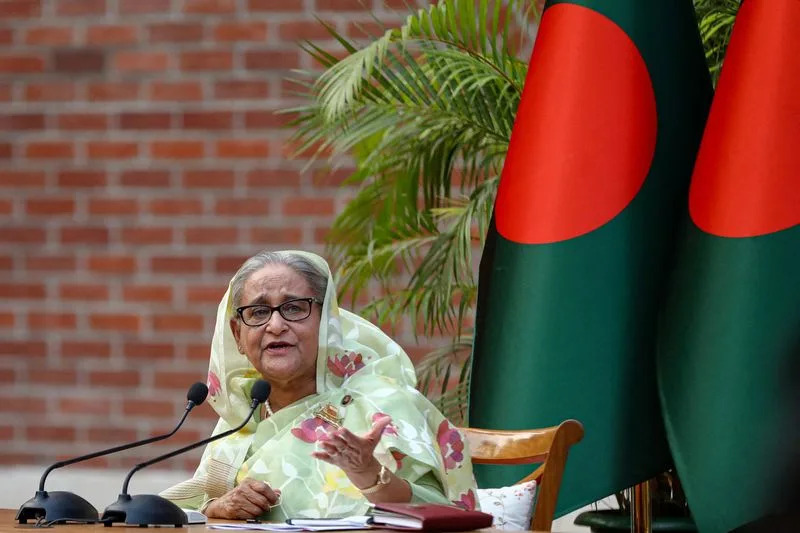
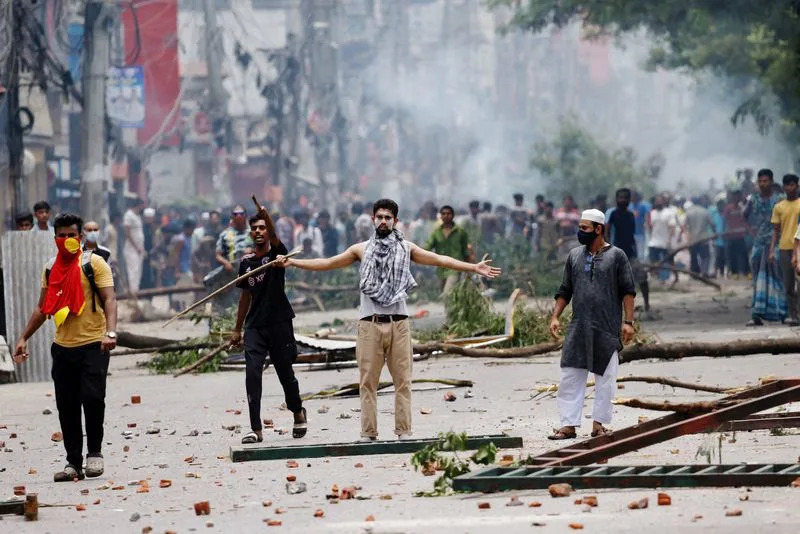
FILE PHOTO: Violence erupts across Bangladesh after anti-quota protest by students
By Ruma Paul
DHAKA (Reuters) - At least 20 people were injured in clashes and police fired rubber bullets and tear gas to disperse crowds as thousands protested in the Bangladeshi capital and other parts of the country on Friday, calling on Prime Minister Sheikh Hasina to resign.
The protesters were demanding justice for the families of the 150 people killed in violence during protests last month over a job quota system.
Scores of youths marched in Dhaka with chants of "we want justice" and waved anti-government banners. Elsewhere in the country, buildings including a district office of the ruling Awami League party were set ablaze, a police booth was set on fire, and armoured vehicles vandalised during demonstrations.
Police said they fired rubber bullets and tear gas as crowds attacked them in northeastern town of Habibganj, and lobbed stun grenades to scatter protesters in the nearby city of Sylhet. A witness in Sylhet said about 20 people were injured.
"They set fire to the local Awami League office and several other government offices and torched motorcycles," said Khalilur Rahman, a police official in Habiganj, adding police had fired rubber bullets and tear gas to control the situation.
The current unrest is the biggest test facing Hasina since deadly protests when she won a fourth-straight term in January elections that were boycotted by the main opposition Bangladesh Nationalist Party.
Student groups led demonstrations last month against quotas in government jobs, including a 30% reservation for families of veterans of the 1971 war of independence from Pakistan.
Those demonstrations spiralled into violence that killed at least 150 people, injured thousands and led to about 10,000 arrests. The protests paused after the Supreme Court scrapped most quotas.
Students have returned to the streets in sporadic protests this week, demanding justice for families of those who were killed. Critics of Hasina and human rights groups have accused her government of using excessive force to stamp out the movement, a charge both Hasina and her ministers deny.
"People make mistakes. If she (Hasina) would have apologised, everything would be back to normal. If she cannot control it, things will keep heating up," said Syed Sadman, a student, at a protest in Dhaka.
(Reporting by Ruma Paul in Dhaka; Writing by Shivam Patel; Editing by Frances Kerry)
JULHAS ALAM
Updated Thu, August 1, 2024
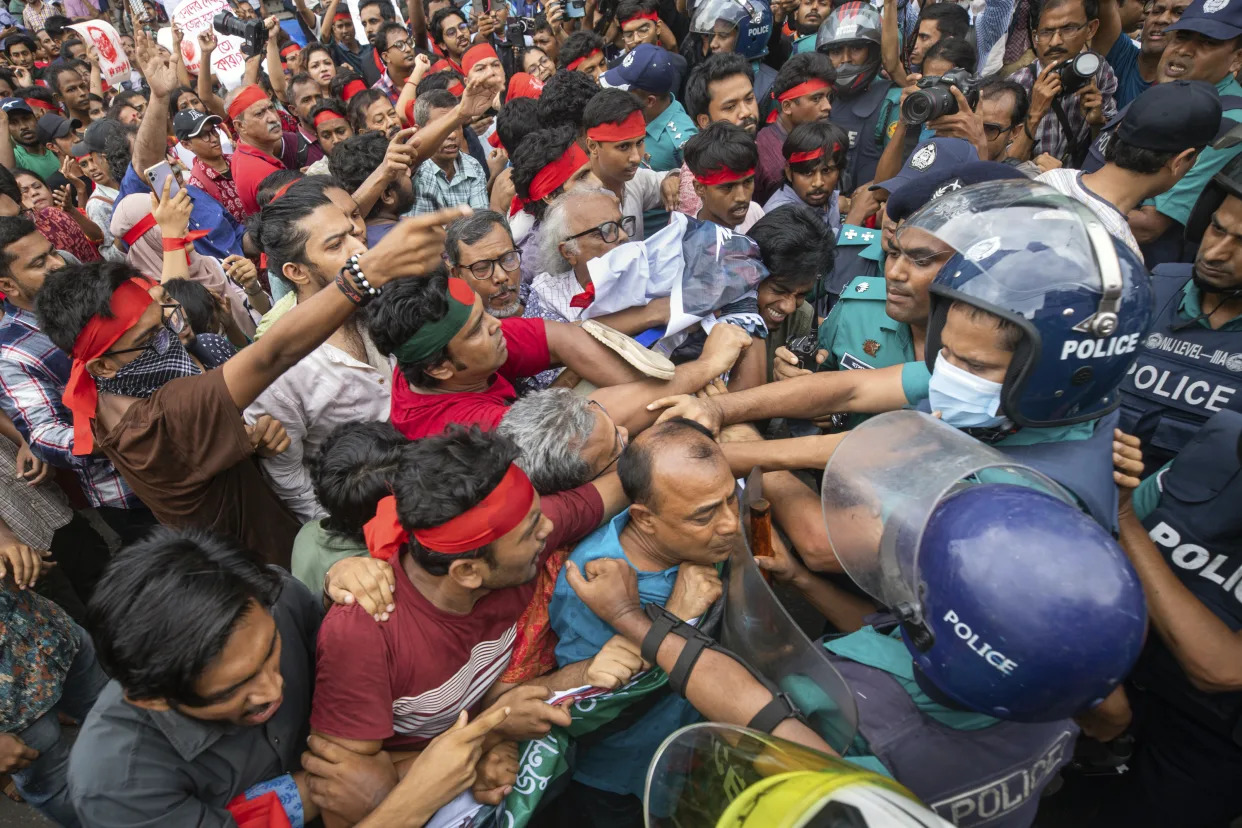
Activists clash with the police as they stage a song march to remember victims of the recent countrywide deadly clashes, in Dhaka, Bangladesh, Tuesday, July 30, 2024. (AP Photo/Rajib Dhar)
DHAKA, Bangladesh (AP) — Bangladesh on Thursday banned the Jamaat-e-Islami party, its student wing and other associate bodies as “militant and terrorist" organizations as part of a nationwide crackdown following weeks of violent protests that left more than 200 people dead and thousands injured.
Bangladesh's Prime Minister Sheikh Hasina and her political partners blamed Jamaat-e-Islami, its Islami Chhatra Shibir student wing and other associate bodies for inciting violence during recent student protests over a quota system for government jobs.
In an official circular seen by The Associated Press, Bangladesh’s Ministry of Home Affairs said Thursday the ban was imposed under an anti-terrorism law.
Since July 15, at least 211 people have died and more than 10,000 people were arrested across the country.
The chief of Jamaat-e-Islami on Thursday rejected the decision in a statement, calling it anti-constitutional, and denied it was behind the recent violence.
“The government carried out massacres by party cadres and state law and order forces in the country to suppress the non-political movement of students. The country’s teachers, cultural personalities, journalists and people of different professions are protesting against this genocide of the government," said Shafiqur Rahman, the party chief.
He accused the government of seeking to cover up its own misdeeds by banning Bangladesh Jamaat-e-Islami and Bangladesh Islami Chhatrashibir.
Before the announcement on Thursday, Hasina separately told a party event that Jamaat-e-Islami and Islami Chhatra Shibir could “go underground” and carry out destructive activities after the ban. She warned that in that case they would be dealt with as militant groups.
She said that the government was set to ban the party for its involvement in the recent violence involving the quota reform movement.
Under Hasina, seen by her critics as an authoritarian, thousands of opposition leaders and activists have been arrested before last election in January when she retruned to power for fourth consecutive time. Global human rights groups have blamed her for using security forces and courts to suppress the opposition. The government has denied such allegations, saying they were arrested on specific charges. Following recent violence, more than 10,000 people including opposiiton figures have been arrested across the country.
Bangladesh Jamaat-e Islami has been banned from taking part in national elections since 2013, after the Election Commission cancelled its registration, a decision later upheld by the High Court.
The court ruled that the party's constitution violated the national constitution by opposing secularism. However, Jamaat-e Islami was not barred from conducting political activities such as holding meetings, rallies and making statements.
Ten years later, the Supreme Court in 2023 upheld the High Court decision, sealing off the long legal battle and barring the party from participating in elections or using party symbols. But again, the Supreme Court did not ban it outright.
Also in 2013, a mass uprising in the Bangladeshi capital, Dhaka, led by youth groups, civil society organizations and secular political parties called for the execution of the Jamaat party leadership for their role in 1971 war crimes.
Jamaat-e Islami was founded during British colonial rule in 1941 by a controversial Islamist scholar and campaigned against the creation of Bangladesh as an independent state during the war of independence from Pakistan in 1971.
Most of the senior leaders of the party have been hanged or jailed since 2013 after courts convicted them of crimes against humanity including killings, abductions and rapes in 1971. The party had formed militia groups to help the Pakistani military during the nine-month war against Pakistan in 1971. Bangladesh won independence on Dec. 16 in 1971 with the help of neighboring India.
Bangladesh says 3 million people died, 200,000 women were raped and nearly 1 million people fled to neighboring India during the war.
The party was banned after Bangladesh’s independence in 1971 for its role in the mass killings and atrocities under the administration of Sheikh Mujibur Rahman, Bangladesh’s founding leader and Hasina’s father. The ban was lifted in 1976, a year after Rahman was assassinated along with most of his family members in a military coup. Only Hasina and her younger sister Sheikh Rehana survived as they were touring Germany in 1975.
Jamaat had also been banned earlier twice, in 1959 and 1964 in Pakistan, for its communal role.
The party held two Cabinet portfolios under a power-sharing agreement with former Prime Minister Khaleda Zia, an arch-rival of Hasina and head of the main opposition Bangladesh Nationalist Party, in 2001-2006.
Mirza Fakhrul Islam Alamgir, secretary-general of Zia's party, on Tuesday said that the decision to ban Jamaat-e-Islami is a tactic of Hasina's administration to divert attention from the current political situation following recent violence.
Bangladesh bans largest Islamic party over terrorism charges
DPA
Thu, August 1, 2024
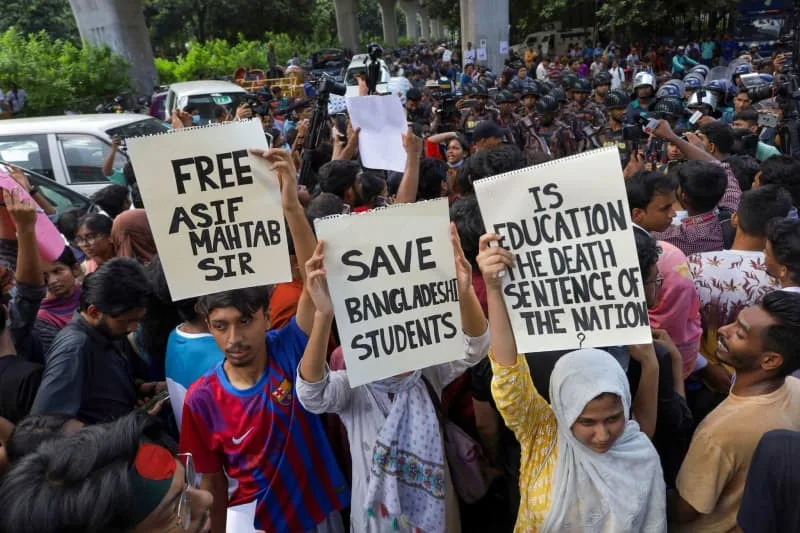
Cultural activists and members of civil society hold a march for victims who were killed during the recent nationwide student protests over quotas in government jobs. Syed Mahabubul Kader/ZUMA Press Wire/dpa
The Bangladeshi government has issued an order outlawing the country's largest Islamic party and all its affiliates in the wake of last month’s deadly unrest that prompted the government to impose a curfew and deploy troops.
As the government believes that Bangladesh Jamaat-e-Islami (Society of Islam, its student wing and its front organizations are involved with terrorist activities, the government declared these banned, the government order issued on Thursday said.
The government possesses enough evidence that Bangladesh Jamaat-e-Islami and its student wing were involved in the recent killings, destructions and terrorist activities directly and through incitement, the order said, referring to the last month’s violent protests over government job quota reforms.
At least 150 people were killed, according to the official counts, during the nationwide protests, but the local media put the death figure at more than 200.
“The Jamaat-e-Islami and its entire front organizations will not be allowed to operate as a political party from now on,” Law, Justice and Parliamentary Affairs Minister Anisul Huq told reporters in Dhaka.
Jamaat, a radical right-wing party advocating for sharia in Bangladesh, was banned soon after Bangladesh’s 1971 war of liberation as it sided with Pakistani forces to carry out atrocities on unarmed civilians during the war.
But it resumed activities in 1977 after the then military dictator Ziaur Rahman allowed the party to operate following the brutal assassination of Bangladesh’s founding president Sheikh Mujibur Rahman in 1975.
The party also joined the coalition government of former prime minister Khaleda Zia, widow of Ziaur Rahman, in 2001.
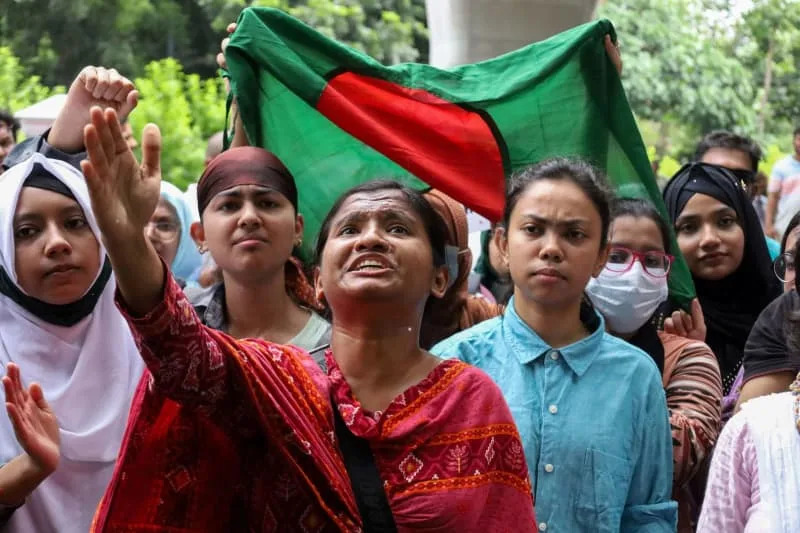
Cultural activists and members of civil society hold a march as part of the nationwide student protests over quotas in government jobs.
Bangladesh police release student leaders after unrest
Shafiqul Alam
Thu, August 1, 2024
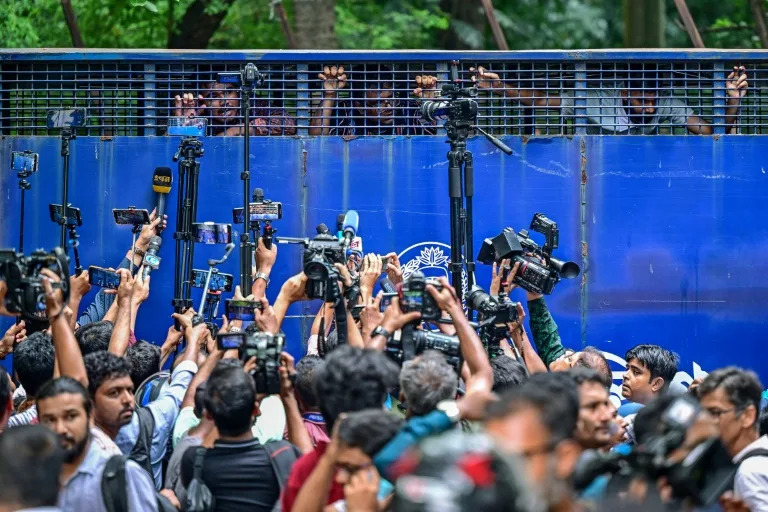
Students Against Discrimination staged nationwide rallies last month that ended in a police crackdown and the deaths of at least 206 people (Munir UZ ZAMAN)
Bangladesh police freed six student leaders on Thursday whose campaign against civil service job quotas sparked deadly nationwide unrest, as the government looked to calm tensions and forestall fresh demonstrations.
Students Against Discrimination staged nationwide rallies last month that ended in a police crackdown and the deaths of at least 206 people, according to an AFP count of police and hospital data.
The group's leadership were among thousands picked up in the police dragnet that followed some of the worst unrest of Prime Minister Sheikh Hasina's 15-year tenure.
"All six quota movement coordinators have been returned to their families this afternoon," deputy commissioner Junaed Alam Sarkar said.
Principal leader Nahid Islam and two others were forcibly discharged from a hospital in the capital Dhaka last Friday by plainclothes detectives and taken to an unknown location.
His father Badrul Islam confirmed to AFP that Nahid Islam had returned home early Thursday afternoon but did not give any more details.
Three others were detained in the following days, with the government saying they had been held for their own safety.
Justice minister Anisul Huq told AFP on Thursday that all six had volunteered to be in police custody.
"They came willingly. They said they wanted to go. They are allowed to return to their parents," he said.
Hasina's government restored order after deploying troops, imposing a curfew and shutting down the mobile internet network across the country of 170 million for 11 days.
More than 10,000 people were arrested in the wake of the unrest, according to Bangladeshi media.
- 'Arbitrary and unlawful' -
Small and scattered protests resumed in cities around Bangladesh this week after other members of Students Against Discrimination ended a moratorium on demonstrations.
They vowed to restart their campaign after the government ignored a Monday deadline for their leaders to be freed.
"Their detention was arbitrary and unlawful. There was growing national and international criticism," University of Oslo researcher Mubashar Hasan told AFP.
He said the release of the student leaders signalled the government was looking to "de-escalate tensions" with the protest movement.
Demonstrations broke out last month over the reintroduction of a quota scheme -- since scaled back by Bangladesh's top court -- that reserved more than half of all government jobs for certain groups.
With around 18 million young Bangladeshis out of work, according to government figures, the move upset graduates facing an acute employment crisis.
Critics say the quota system was used to stack public jobs with loyalists to the ruling Awami League.
- 'Excessive and lethal force' -
Hasina has ruled Bangladesh since 2009 and won her fourth consecutive election in January after a vote without genuine opposition.
Her government is accused by rights groups of misusing state institutions to entrench its hold on power and stamp out dissent, including the extrajudicial killing of opposition activists.
Ministers accused opposition parties of stirring up unrest, which saw arson and vandalism attacks by crowds against government buildings and dozens of police posts.
The government enacted a ban on Thursday on Jamaat-e-Islaami, Bangladesh's largest Islamist party, that outlawed the organisation and prohibited it from staging any public gatherings.
The protests last month had remained largely peaceful until attacks on demonstrators by police and pro-government student groups.
European Union foreign policy chief Josep Borrell this week condemned the police clampdown that followed for "excessive and lethal force against protesters and others".
A human rights law firm wrote to the International Criminal Court in The Hague on Thursday on behalf of Australia's Bangladeshi diaspora seeking a preliminary examination into the violence.
"There is no evidence that the Bangladeshi Government will properly investigate the situation itself in an independent or thorough manner," the brief said.
Any person or group can make a request to the ICC but it is not obliged to take up a case.
sa/gle/pbt


